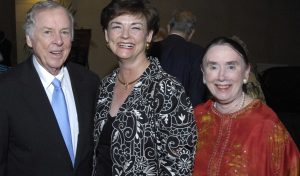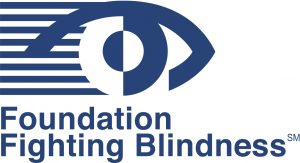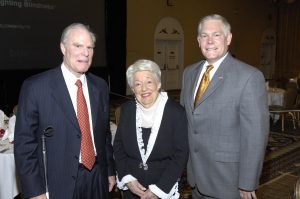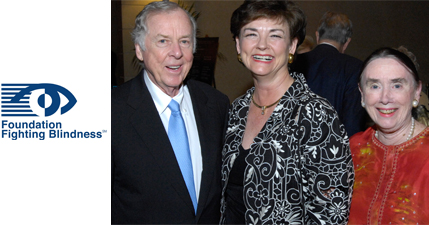 Foundation Fighting Blindness drives research that will provide preventions, treatments, and cures for people affected by retinitis pigmentosa, macular degeneration, Usher syndrome, and the entire spectrum of retinal degenerative diseases.
Foundation Fighting Blindness drives research that will provide preventions, treatments, and cures for people affected by retinitis pigmentosa, macular degeneration, Usher syndrome, and the entire spectrum of retinal degenerative diseases.
Since its founding in 1971, the Foundation Fighting Blindness has funded innovative research to find preventions, treatments, and cures for inherited retinal degenerative diseases that lead to blindness and affect more than 10 million people in the United States.
 The Pickens Foundation has supported FFB for several years. Pickens has firsthand knowledge of its work. He was diagnosed with macular degeneration more than 20 years ago, and his father had the same disease.
The Pickens Foundation has supported FFB for several years. Pickens has firsthand knowledge of its work. He was diagnosed with macular degeneration more than 20 years ago, and his father had the same disease.
“I’ve adapted to my double vision, but I obviously believe in the research being done in this field,” Pickens says. “The more research and general awareness we can get in this area, the better off the more than 10 million afflicted Americans will be.”
 One of the ways FFB raises awareness about vision problems and its mission is by hosting “Dining in the Dark” fundraisers in cities across the country. Attendees eat in darkness. All the servers are blind. The diners don’t know what they’re eating or drinking until it reaches their mouths. And they do it all in cocktail attire. The concept originated at the Blindekuh (Blind Cow) Restaurant in Zurich, Switzerland. Opaque, a restaurant in Los Angeles, brought it to the States. During the dinners, exit signs, windows, and anything else that emits light are covered, ropes and stanchions are set up between tables, and the blind servers are trained to find their way around. The FFB’ held its first Dining in the Dark in Orange County in February 2007.
One of the ways FFB raises awareness about vision problems and its mission is by hosting “Dining in the Dark” fundraisers in cities across the country. Attendees eat in darkness. All the servers are blind. The diners don’t know what they’re eating or drinking until it reaches their mouths. And they do it all in cocktail attire. The concept originated at the Blindekuh (Blind Cow) Restaurant in Zurich, Switzerland. Opaque, a restaurant in Los Angeles, brought it to the States. During the dinners, exit signs, windows, and anything else that emits light are covered, ropes and stanchions are set up between tables, and the blind servers are trained to find their way around. The FFB’ held its first Dining in the Dark in Orange County in February 2007.
“Mr. Pickens’ generous support of the Foundation Fighting Blindness and leadership in the Dallas community have been instrumental in moving us closer to finding treatments and cures for blinding retinal diseases,” says Bill Schmidt, the Foundation’s chief executive officer.
The FFB is the leading non-governmental funder of retinal degenerative disease research in the world. As of the summer of 2014, FFB has raised $600 million and has proven to be the driving force in this field.
In its 2013 yearend report, it reported funding 120 research studies at 110 research institutions and eye hospitals worldwide, including 13 dedicated research centers. Foundation-funded studies include cutting-edge research in many areas, such as cell biology, drug delivery, genetics, gene therapy, retinal cell transplantation, retinal implants, and pharmaceutical and nutritional therapies. In addition, FFB established the National Neurovision Research Institute as a non-profit support subsidiary to expedite the translation of fundamental research into clinical trials for inherited retinal degenerative diseases and, ultimately, to accelerate the availability of patient therapies.
For more information, visit www.FightBlindness.org.

Published by